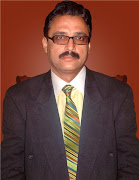
Contrary to the general notion that Karachi is located on the major earthquake fault lines, researchers at the Sir Syed University of Engineering & Technology (SSUET), have discovered that Karachi is in fact situated along the Minor Earthquake Zone and is not prone to any major or devastating earthquakes.
The Institute of Human Settlement and Environment (IHSE) at the SSUET Department of Civil Engineering has also established that Murray Ridge Area, located about 200 kilometres southwest of Karachi, in the North Arabian Sea is vulnerable to the generation of Tsunami if a major earthquake strikes the region.
Civil Engineering Department Chairman, Dr S.M. Makhdumi, informed The News that IHSE has prepared four reports on disaster management , that include Disaster Preparedness & Development of Warning System for Coastal Region of Pakistan, Global Warming, Planning & Mitigation and Seismic Zones of Pakistan.
Dr Makhdumi said that IHSE that was established in 2001 has been working on the projects that are vital to the general public. “It has undertaken exhaustive scientific studies of natural disasters affecting Sindh and Coastal North Arabian Sea. The study established the vulnerability of coastal waters, south of Karachi, to the occurrence of Tsunami and recommends development of ‘Warning System’ for effective remedial and relief measures necessary to minimise the loss of human lives in case a Tsunami hits the coastal regions of Sindh.”
The IHSE has also updated the existing seismic zone map of Pakistan (1980) on the pattern of Sindh-Balochistan map already published by the university. The revised Seismic Zone Map of Pakistan, according to Dr Makhdumi, will assist the engineering institutions in Pakistan in revising and updating the building code of the country.
Former Pakistan Meteorological Services Director General, Syed Amir Ahmed Kazmi, who is currently an environment consultant at SSUET, said that the major seismic fault in Sindh, Sarjan-Jampir Fault, which devastated upper Sindh and buried Moenjodaro some 5000 years ago and remained active for centuries, is (according to the new definition of Active Fault 1986) in the process of stabilisation. “No major earthquake has struck Sindh during the last several centuries”, Kazmi asserted.
According to Kazmi, the Rann of Kutch area is seismically active and has generated Tsunamis in the past. However, due to the drying up of the sea water in the area around the island, the Rann of Kutch is now a solid mass of land and unlikely to generate Tsunamis in future. “Tsunamis will continue to be generated along the Makran coastal waters in future and cause major damage to Pasni, Gwadar, Jiwani and other towns in the coastal areas of Balochistan. However Tsunamis occurring along Makran Coast are not expected to cause damage to the Karachi coastal region”, Kazmi explained.
Shahid Saleem, Assistant Professor at the SSUET Department of Civil Engineering, and a member of IHSE team talked about the lethal effect that Tsunami could have. “Tsunamis can move at the speed of a hundred miles per hour, and its waves can be as high as 100 feet or more. The time lag between the occurrence of Tsunami and its waves hitting the coast is the controlling factor. This is the time that could wisely be used to minimise the brutal force of Tsunami if a warning system exists in the area”, Saleem emphasised
Pacific Tsunami Warning System, according to Kazmi, has two Warning Systems in Hawaii and Alaska. The United Nations, in collaboration with World Conference on Disaster Reduction (WCDR), had decided to set up a Tsunami Warning System in the Indian Ocean after the devastating Tsunami that hit several countries of the region. The system was installed in 2006 and
now 25 countries have joined in. The countries include Indonesia, Sri Lanka, Thailand, Burma, the Maldives, the Seychelles, Kenya, Tanzania and France (for Réunion), Australia and India.









































